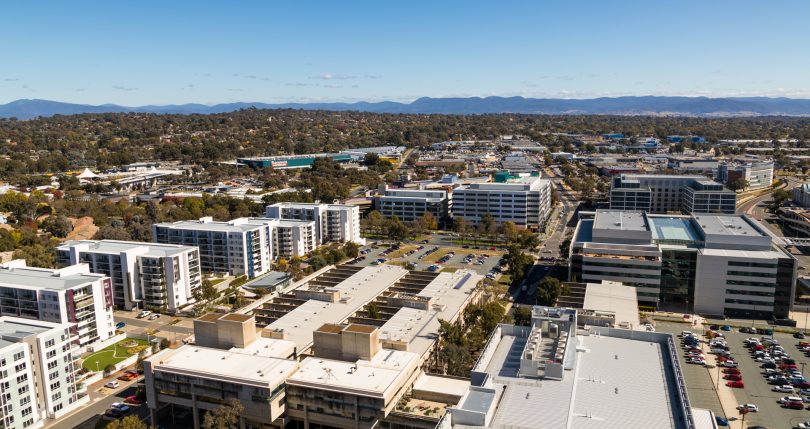
Vantage Strata’s Chris Miller says 70 per cent of all new housing supply in the ACT will be some form of strata title property from now until forever. Photo: Michelle Kroll.
In the face of housing affordability challenges the prevalence of strata living continues to rise. With it comes a growing need for a dedicated, impartial figure to support the sector and provide adequate compliance management.
Experts are calling for the ACT to appoint its own strata commissioner, as NSW did in 2021.
Vantage Strata director of business development Chris Miller said for numerous reasons more than a fifth of the ACT’s population lived in strata-titled buildings, pointing to the important role strata property played in the Australian housing market.
“Affordability is perhaps the biggest one at the moment. Strata-titled properties, where many people utilise a piece of land, are a more efficient kind of property ownership,” he said.
“There’s also the matter of land supply. There’s no capacity to just continue to expand into new suburbs with house and land packages infinitum, so it’s an inescapable conclusion there needs to be more strata development.
“Strata-titled developments also offer access to amenities – shops and work hubs. This means pressure on municipal service and infrastructure is reduced. Every time a new suburb gets further away from employment hubs, that’s more roads required, public transport, stormwater drains – infrastructure gets less efficient the further out we go.
“Whether you subscribe to that philosophy or not, it remains that 70 per cent of all new housing supply in the ACT will be some form of strata-titled property from now until forever.”
Mr Miller said strata regulation was currently covered as part of the broader property services industry, and that was increasingly problematic.
“Consequently, people living in strata-titled buildings don’t have particular advocacy considering their interests at the government or regulator level,” he said.
“The problems that need attention in the strata world are really unique to strata and need more specific regulation and oversight. For example, how owners seek access to support for managing building defects.
“Future issues that will arise will also have an outsized impact on strata-titled properties. For example the electrification of buildings. At a single property level that’s fairly uncomplicated. However when you consider most apartment complexes built in the last quarter of a century have centralised gas hot water services, it’s infinitely more complicated when you consider those buildings will need to replace all of that infrastructure in the coming decades.
“I can’t think of a good reason why this shouldn’t be a priority for any government. In the past you might’ve argued it was too niche to warrant the expense. That’s clearly not the case now and it will never be again, for as long as Canberra exists.”
Owners Corporation Network ACT president Gary Petherbridge said the positive economic impact strata living had in the ACT was largely underestimated.
He estimated 160,000 ACT taxpayers were owners, non-resident investors or tenants in the 80,000 strata units, but said this was probably a conservative figure.
“High-rise developments around the town centres are the equivalent of a large new suburb where the residents continually pay for a lot of the infrastructure and all the amenities,” he said.
Mr Petherbridge called for the rates and land taxes charged by the ACT Government on strata properties to be reviewed to account for the reduced land usage, infrastructure and amenities that “vertical living precincts” provided for themselves, versus the cost to the ACT taxpayer of building new suburbs.
This was among the many issues he said would fall under the remit of a strata commissioner. Others included drumming up support for environmental initiatives, lobbying for effective legislation to improve minimum standards for strata buildings, addressing issues such as noise pollution, the equitable distribution of security resources, and the establishment of an industry emergency fund for urgent defect rectifications and resolving disputes.
“If we appointed a strata commissioner, they could address all things related to strata living and dedicate a ministerial portfolio backed by the support of a government unit,” he said.
Strata Community Association (SCA) ACT president Shelley Mulherin said the establishment of a strata commissioner in the ACT was “long overdue” and would help address issues related to building defects, maintenance and the installation of sustainable infrastructure such as electric vehicle charging stations.
“The appointment of a strata commissioner would not only benefit the thousands of individuals living in strata communities but also contribute to the overall efficiency and effectiveness of the strata industry in the ACT,” she said.
“As we approach the upcoming election, we urge all political parties to consider the importance of this initiative for the betterment of strata living in the Territory.”




















